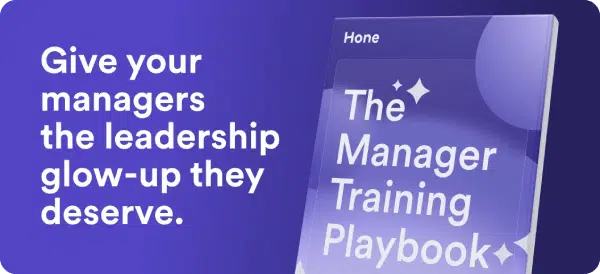Studies show that a whopping 70% of team engagement comes down to the manager. And if a manager isn’t great, it can mean employees waste 10-52% of their time at work! So it’s safe to say that managers make a really big difference in how engaged and productive their teams are, and that impacts how well a business performs. So let’s talk about how to develop leadership skills.
On the bright side, when managers are emotionally smart — meaning they understand themselves and others — their teams tend to be happier, more creative, and come up with better ideas. According to the Hay Group, managers who focus on soft skills can boost their team’s performance by as much as 30%. That’s why Hone, after teaching 300,000+ learners, has put together four proven learning pathways to help managers learn these important skills at every step of their journey.
How to develop leadership skills
Learning Program 1: Aspiring Manager Essentials
The objective of this first learning pathway is to prime your high-potential employees for their next leadership step. You can use a program like this to nurture a diverse and motivated pipeline of future people managers.
Key skills to focus on at this stage
- Multi-directional influence: As a manager, you need to influence not only those you directly supervise but also your peers, superiors, and even external stakeholders. Being able to influence in multiple directions ensures that you can advocate for your team, align goals across departments, and navigate complex organizational dynamics.
- Cross-functional collaboration: In today’s interconnected business world, success relies on collaboration across different functions and departments. Developing skills in cross-functional collaboration — like communication, conflict management, adaptability, and more — enables you to leverage diverse perspectives, break down silos, and drive collective success.
- Deeper self-awareness: Effective leadership begins with self-awareness. Understanding your strengths, weaknesses, values, and how you impact others is crucial for making informed decisions, managing interpersonal relationships, and continuously improving as a leader. Deeper self-awareness also fosters empathy, which is essential for building trust and motivating your team.
Classes to include in this learning pathway
|
SKILLS TO BE LEARNED How to prioritize individual and group deposits to inspire influence and build partnerships |
SKILLS TO BE LEARNED How to increase the likelihood that you will achieve your goals by making them more visible |
|
Get Feedback That Improves Your Performance SKILLS TO BE LEARNED How to ask goal-based questions that lead others to give you concrete suggestions for how to improve How to receive feedback well and make the most of it – even if it is not delivered in the most helpful way |
Collaborate in a Dynamic Workplace SKILLS TO BE LEARNED How to communicate priorities and tasks explicitly How to hold others accountable to deadlines |
When designing a learning program for aspiring managers, it’s important to focus on skills that they can use both now in their current role and in future roles as a people manager. By honing these skills, aspiring managers can better navigate the complexities of leadership, drive organizational success, and cultivate a positive work environment where individuals and teams thrive.
Learning Program 2: Manager Core
Building trusting relationships, coaching, and giving effective feedback on a regular cadence are the foundational skills that empower your people managers to drive performance from direct reports. Use this program to help managers as they shift their focus from managing themselves to managing others.
Key skills to focus on at this stage
- Building trust and psychological safety: Trust is the foundation of any successful team. As a new manager, establishing trust among your team members is crucial for fostering open communication, collaboration, and innovation. Psychological safety, which involves creating an environment where team members feel safe to take risks, share their ideas, and express themselves without fear of judgment or reprisal, is equally important. Building trust and psychological safety helps to enhance team cohesion, engagement, and overall performance.
- Coaching and giving feedback: Effective coaching and feedback are essential for guiding your team members toward their full potential. As a new manager, you play a pivotal role in developing the skills and capabilities of your team. Providing regular feedback helps individuals understand their strengths and areas for improvement, while coaching enables you to support their professional growth and development. By mastering these skills, you can empower your team members to continuously improve and achieve their goals.
- Performance management: Performance management involves setting clear expectations, monitoring progress, providing feedback, and recognizing achievements. As a new manager, effectively managing the performance of your team ensures that everyone is aligned with organizational goals and priorities. It also enables you to identify and address any performance issues promptly, fostering a culture of accountability and continuous improvement.
Classes to include in this learning pathway
|
Build High-Trust Relationships SKILLS TO BE LEARNED How to understand the emotional bank account and theory of deposits and withdrawals How to cultivate deeper trust using the trust equation |
SKILLS TO BE LEARNED How to ask powerful, open-ended questions How to use the GROW model to lead coaching conversations |
|
SKILLS TO BE LEARNED How to acknowledge and validate How to ask effective open-ended questions |
SKILLS TO BE LEARNED The keys to leading highly-effective 1:1’s |
By developing these key skills, new managers can build strong relationships with their team members, foster a positive work environment, and drive performance and success within their teams and organizations.
Learning Program 3: Manager Advanced
The objective of this program is to build next-level people management skills to keep direct reports’ growth, motivation, and performance high. Use this program to grow managers who have mastered the basics of coaching for performance and are ready to focus on the next cross-section of skills to get the most out of their teams.
Key skills to focus on at this stage
- Coaching: Advanced people managers need to go beyond simply directing their teams; they must empower individuals to reach their full potential. Effective coaching involves guiding team members through challenges, helping them develop new skills, and providing ongoing support and encouragement. By honing their coaching skills, advanced managers can cultivate a culture of learning and growth within their teams, ultimately driving higher performance and job satisfaction.
- Motivation: Maintaining high levels of motivation among team members is essential for sustaining productivity and engagement. Advanced managers must understand the unique motivators of each individual on their team and tailor their leadership approach accordingly. Whether through recognition, meaningful work assignments, or opportunities for growth, skilled managers inspire and energize their teams to achieve exceptional results.
- Team career development: As managers progress in their careers, they take on greater responsibility for the professional development of their team members. This involves not only identifying career aspirations and goals but also creating pathways for advancement and providing the necessary support and resources to help individuals succeed. By investing in team career development, advanced managers foster loyalty, commitment, and a sense of belonging among their employees, leading to higher retention rates and a more skilled workforce.
Classes to include in this learning pathway
|
SKILLS TO BE LEARNED How to offer supportive coaching, constructive feedback, and encouragement to foster growth 360 listening to understand various perspectives and promote effective communication and collaboration |
Manage to Your Teams Strengths SKILLS TO BE LEARNED How to help your team utilize and grow their strengths both in their day to day work and at key moments throughout the year |
|
SKILLS TO BE LEARNED How to effectively communicate when using growth-based delegation How to address resistance when delegating to your direct reports |
SKILLS TO BE LEARNED Applying PERMAH mindsets and behaviors on your team to enhance team culture |
Continuing to refine these key skills allows advanced people managers to create an environment where individuals thrive, teams excel, and organizational goals are consistently met.
Learning Program 4: Manager Mastery
This program focuses on how to develop leadership skills needed for the next level, from leaders of business units. From understanding how one’s individual leadership style impacts the team to developing holistic strategies to drive business revenue, this is for the more senior leaders in an organization. Use this program for managers of teams, functions, and/or departments.
Key skills to focus on at this stage
- Team culture development: A strong team culture is the foundation of high-performing teams. Seasoned people managers must continuously nurture and evolve the culture within their teams to ensure alignment with organizational values and goals. By fostering a culture of trust, collaboration, and accountability, managers can enhance team cohesion, morale, and productivity.
- Adaptability and change management: In today’s fast-paced business environment, the ability to adapt to change is essential for organizational success. Seasoned managers must be adept at navigating uncertainty, embracing innovation, and leading their teams through periods of transition. By developing skills in change management, managers can effectively communicate change initiatives, mitigate resistance, and ensure that teams remain focused and resilient amidst uncertainty.
- Strategy development and execution: As managers ascend to more senior roles, they play a critical role in shaping and executing organizational strategy. Seasoned managers must possess the ability to analyze market trends, identify strategic opportunities, and translate vision into actionable plans. By developing strategic thinking skills and fostering alignment across teams, managers can drive sustainable growth and competitive advantage for their organizations.
Classes to include in this learning pathway
|
Lead Psychologically Safe Teams SKILLS TO BE LEARNED How to choose the right leadership approach in different situations How to model behaviors that lead to a positive climate and psychological safety |
SKILLS TO BE LEARNED How to articulate your vision and ideas clearly and persuasively How to use your body language to change how you are perceived in the workplace |
|
Develop a Differentiated Strategy SKILLS TO BE LEARNED How to navigate the tradeoffs of a focused team strategy How to involve each stakeholder in the team strategy to create accountability and agility |
SKILLS TO BE LEARNED What agility looks like across several key team processes How to foster an environment of educated risk-taking and experimentation |
Continuing to enhance these key skills allows seasoned people managers to remain agile, responsive, and effective leaders in an ever-evolving business landscape.
How to easily build these programs and deploy them to your managers
Investing in manager development is not just beneficial, but essential for fostering a culture of excellence and ensuring sustainable success within organizations. The learning programs outlined here offer a structured and comprehensive approach to upskilling managers in essential skills at every stage of their management journey.
With Hone Membership, organizations gain unlimited access to a diverse range of manager training programs tailored to enhance leadership capabilities. Plus, through Hone Membership, organizations can seamlessly track progress, measure impact, and adapt training initiatives continuously to maximize effectiveness and drive tangible results. By prioritizing manager development with Hone Membership, organizations can empower their leaders to thrive in today’s dynamic business environment and achieve long-term success.
Already a Hone customer? Start building your Membership programs today.



























